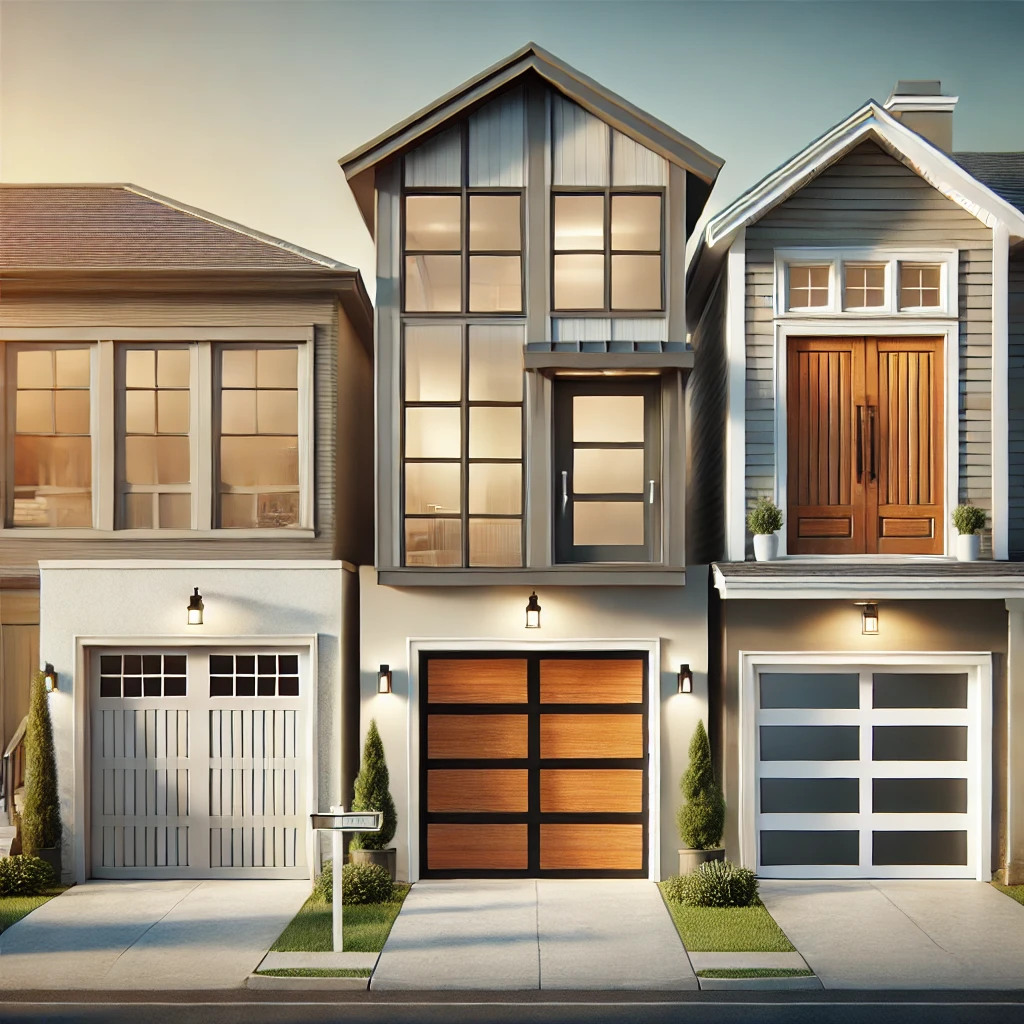
How to Choose the Right Garage Door for Your Home
A garage door is more than just a functional entryway—it’s a crucial element of your home’s curb appeal, security, and energy efficiency. Choosing the right garage door involves more than picking a design you like; factors like material, insulation, security, and budget all play a role in finding the best option for your home. In this comprehensive guide, we’ll help you navigate the process of selecting the perfect garage door to enhance your home’s aesthetic and functionality.
1. Selecting the Best Garage Door Material
The material of your garage door affects its durability, maintenance needs, insulation, and cost. Here are the most common options:
Steel Garage Doors
Steel is one of the most popular garage door materials due to its durability and versatility.
- Pros: Strong, low maintenance, available in various styles and finishes.
- Cons: Can dent easily, susceptible to rust in coastal areas if not properly treated.
- Best for: Homeowners looking for a balance between cost, durability, and aesthetics.
Wood Garage Doors
Wood garage doors provide a classic, high-end look that adds warmth and elegance.
- Pros: Beautiful appearance, customizable, available in different wood species.
- Cons: High maintenance, expensive, susceptible to moisture damage if not properly sealed.
- Best for: Those who prioritize aesthetics and are willing to invest in maintenance.
Aluminum Garage Doors
Aluminum is lightweight and resistant to rust, making it ideal for coastal homes.
- Pros: Rust-resistant, modern appearance, lightweight, low maintenance.
- Cons: Less durable than steel, can dent easily.
- Best for: Contemporary homes and those in humid or coastal climates.
Fiberglass Garage Doors
Fiberglass doors mimic the look of wood while offering durability and weather resistance.
- Pros: Resistant to dents and rust, lightweight, energy-efficient.
- Cons: Can crack in extreme cold, limited customization options.
- Best for: Homeowners seeking a wood-like appearance with less maintenance.
Vinyl Garage Doors
Vinyl doors are durable and require little maintenance.
- Pros: Resistant to dents, rust, and extreme weather.
- Cons: Limited style and color choices, higher initial cost.
- Best for: Families with children or areas prone to extreme weather conditions.
2. Choosing the Right Style
Your garage door should complement your home’s architectural style. Here are some popular styles:
Traditional Raised-Panel Garage Doors
These are the most common and feature a symmetrical, classic look with rectangular panels.
- Best for: Traditional, colonial, or ranch-style homes.
Carriage House Garage Doors
Designed to resemble old-fashioned carriage house doors, these add charm and character.
- Best for: Farmhouse, cottage, and rustic-style homes.
Contemporary Garage Doors
Modern garage doors feature clean lines, glass panels, and minimalistic designs.
- Best for: Mid-century modern and contemporary homes.
Custom Garage Doors
For a unique touch, custom garage doors allow you to personalize the design, color, and materials.
- Best for: Homeowners who want a one-of-a-kind look.
3. Picking the Perfect Color
The color of your garage door should complement your home’s exterior rather than clash with it.
Neutral Tones
- White, beige, gray, or brown are classic choices that blend well with most homes.
Bold Colors
- Deep blues, greens, and reds can create a striking contrast.
Wood Finishes
- Faux wood or stained finishes give a natural, elegant touch.
Pro Tip: Consider matching your garage door to your home’s trim or front door for a cohesive look.
4. Understanding Insulation and Energy Efficiency
An insulated garage door can improve energy efficiency, especially if your garage is attached to your home.
Types of Insulation:
- Polystyrene Insulation: More affordable but offers moderate insulation.
- Polyurethane Insulation: Denser and provides better energy efficiency and noise reduction.
Best Choice: Look for garage doors with a high R-value (thermal resistance) to maximize energy savings.
5. Security Features to Consider
Your garage door should keep your home safe from break-ins.
Essential Security Features:
- Rolling Code Technology: Changes access codes with every use to prevent hacking.
- Smart Garage Door Openers: Allow remote monitoring and control via a mobile app.
- Heavy-Duty Locks: Reinforced locking mechanisms enhance security.
6. Budget Considerations
Garage doors vary widely in price based on materials, insulation, and features.
Estimated Costs by Material:
- Steel: $750 – $3,500
- Wood: $1,200 – $5,000
- Aluminum: $900 – $2,500
- Fiberglass: $1,000 – $3,000
- Vinyl: $1,000 – $4,000
Tips to Save:
- Choose a basic design with fewer customizations.
- Look for seasonal discounts and promotions.
- Consider long-term costs—investing in a durable, insulated door can save on energy bills.
7. Hiring a Professional vs. DIY Installation
Professional Installation
- Ensures correct fitting and long-term reliability.
- Often includes warranty and after-service support.
DIY Installation
- Possible for basic, lightweight doors.
- Requires tools, skills, and knowledge of safety precautions.
Recommendation: Unless you have experience, hiring a professional ensures safety and proper function.
Final Thoughts: Making the Right Choice
Choosing the right garage door involves balancing style, material, insulation, security, and budget. Whether you prioritize aesthetics, energy efficiency, or security, there’s a perfect garage door for your home. Rose Quality Garage Doors offers a wide selection of premium garage doors and expert installation services. Contact us today to find the best garage door solution for your home!